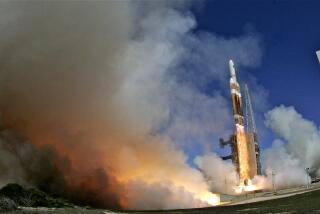Iraq Denies Trading Missile Shots With U.S. Jet : Persian Gulf: Baghdad suggests pilot was ‘hallucinating.’ It denies that incident in ‘no-fly’ zone ever happened.
- Share via
BAGHDAD, Iraq — The Iraqi government Sunday flatly denied a Pentagon report that it had exchanged missile fire with U.S. warplanes over southern Iraq, suggesting the report was based on an American pilot’s “hallucinations” or a deliberate Clinton Administration attempt to rekindle anti-Iraq sentiment.
U.S. military officials say Iraq launched a surface-to-air missile at an American fighter jet late Saturday after it destroyed an Iraqi antiaircraft battery that had targeted the jet with radar. In a clear effort to downplay the incident, an official Iraqi spokesman simply denied it ever happened.
The Iraqi spokesman, who asked not to be named, noted that a U.S. jet enforcing the ban on Iraqi military flights below its 32nd Parallel did “violate Iraqi airspace.” But he added that the U.S. pilot’s report of missile fire by either side “is either an expression of hallucination on his part, or certain parties in the American Administration are trying, as usual, to create a crisis.”
Within hours of the statement, Baghdad went out of its way to welcome an all-American team of U.N. weapons monitors, who arrived on a controversial mission to install six surveillance cameras at two key missile test sites south of the capital.
The team’s leader, Bill Eckert, said his technicians today will begin hooking up cameras that he likened to those at automatic bank-teller machines.
Eventually, he said, the cameras will be fixed on four launching platforms and two control panels to ensure that Iraq does not test ballistic missiles with ranges beyond 150 kilometers. Such missiles are banned along with nuclear, chemical and biological weapons under U.N. resolutions ending the Persian Gulf War.
Baghdad had initially refused to allow the cameras at the missile test sites, drawing warnings of military action from the United Nations and the United States.
But under a compromise reached last week with a U.N. envoy, Iraq consented to the cameras’ installation and the United Nations agreed to hold extensive negotiations to plan long-term weapons monitoring and fix a formula of compliance that will end three crippling years of trade sanctions against Iraq. Those talks are scheduled for late August or early September.
The cameras installed by Eckert’s team will be left unplugged until the talks are completed.
During his first meeting with the Iraqi military Sunday, Eckert said that the Iraqis’ tone was “not only positive but we both said we believe we are looking at change--change for the better.”
Senior Iraqi officials reflected a similar tone during a series of interviews with The Times during the past week. Information Minister Hamid Youssef Hammadi said Baghdad intends to pursue a “softer” tone in its relations with the U.N. Security Council.
More to Read
Sign up for Essential California
The most important California stories and recommendations in your inbox every morning.
You may occasionally receive promotional content from the Los Angeles Times.










